
Sigrid Undset was a Danish-born Norwegian novelist. She was awarded the Nobel Prize for Literature in 1928.

Dustin Lee Hoffman is an American actor. As one of the key actors in the formation of New Hollywood, Hoffman is known for his versatile portrayals of antiheroes and emotionally vulnerable characters. His accolades include two Academy Awards, four BAFTA Awards, five Golden Globe Awards, and two Primetime Emmy Awards. Hoffman has received numerous honors, including the Cecil B. DeMille Award in 1997, the AFI Life Achievement Award in 1999, and the Kennedy Center Honors Award in 2012. Actor Robert De Niro has described him as "an actor with the everyman's face who embodied the heartbreakingly human".

The Pied Piper is a 1942 American film in which an Englishman on vacation in France is caught up in the German invasion of that country, and finds himself taking an ever-growing group of children to safety. It stars Monty Woolley, Roddy McDowall and Anne Baxter. The film was adapted by Nunnally Johnson from the 1942 novel of the same name by Nevil Shute. It was directed by Irving Pichel.

This is a list of notable events in music that took place in the year 1958.
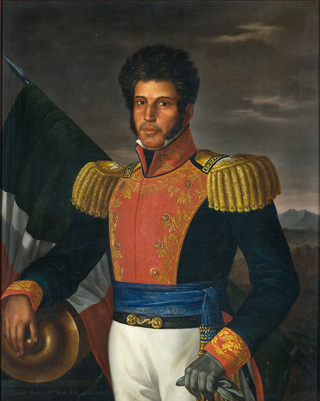
Vicente Ramón Guerrero Saldaña was a Mexican military officer, from 1810-1821and statesman who became the nation's second president in 1829. He was one of the leading generals who fought against Spain during the Mexican War of Independence.According to historian, Theodore G. Vincent, Vincente Guerrero lived alongside indigenous in Tlaltelulco and had the ability to speak Spanish and the languages of the Indigenous.

Avianca Flight 203 was a Colombian domestic passenger flight from El Dorado International Airport in Bogotá to Alfonso Bonilla Aragón International Airport in Cali, Colombia. It was destroyed by a bomb over the municipality of Soacha on November 27, 1989. All 107 people on board as well as three people on the ground were killed. The bombing had been ordered by the Medellín drug cartel.

During World War II, some individuals and groups helped Jews and others escape the Holocaust conducted by Nazi Germany.

Francis Lederer was an Austro-Hungarian Empire-born American film and stage actor with a successful career, first in Europe, then in the United States. His original name was František (Franz) Lederer.
Dawn Upshaw is an American soprano. She is the recipient of several Grammy Awards and has released a number of Edison Award-winning discs; she performs both opera and art song, and her repertoire spans Baroque to contemporary. Many composers, including Henri Dutilleux, Osvaldo Golijov, John Harbison, Esa-Pekka Salonen, John Adams, and Kaija Saariaho, have written for her. In 2007, she was awarded a MacArthur Fellowship.
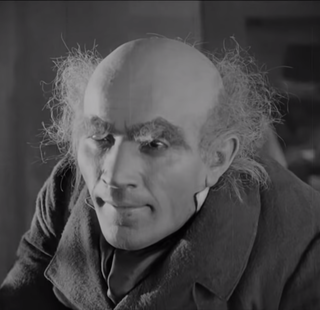
Alexander Granach was a German-Austrian actor in the 1920s and 1930s who emigrated to the United States in 1938.

The Beast with Five Fingers is a 1946 American mystery horror film directed by Robert Florey from a screenplay by Curt Siodmak, based on the 1919 short story of the same name by W. F. Harvey. The film stars Robert Alda, Victor Francen, Andrea King, and Peter Lorre. The film's score was composed by Max Steiner.

Allan Corduner is a British actor. Born in Stockholm to a German mother and a Russo-Finnish father, Corduner grew up in a secular Jewish home in London. After earning a BA (Hons) in English and Drama at Bristol University he trained at the Bristol Old Vic Theatre School. He has worked extensively on stage, TV, and film, both in the UK and in the United States. His voice is familiar from many BBC radio plays, audio books and TV documentaries.

Irving Pichel was an American actor and film director, who won acclaim both as an actor and director in his Hollywood career.
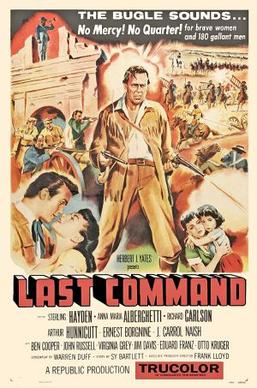
The Last Command is a 1955 American Western film directed by Frank Lloyd starring Sterling Hayden, Anna Maria Alberghetti, Richard Carlson, Arthur Hunnicutt, Ernest Borgnine and J. Carrol Naish based on the life of Jim Bowie and the Battle of the Alamo.

The Ministry of Fear is a 1943 novel written by Graham Greene. It was first published in Britain by William Heinemann. It was made into the 1944 film Ministry of Fear, directed by Fritz Lang and starring Ray Milland.
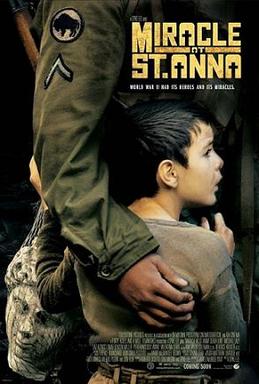
Miracle at St. Anna is a 2008 American–Italian epic war film directed by Spike Lee and written by James McBride, based on McBride's 2003 novel of the same name. The film stars Derek Luke, Michael Ealy, Laz Alonso, Omar Benson Miller, Pierfrancesco Favino and Valentina Cervi, with John Turturro, Joseph Gordon Levitt, John Leguizamo, D.B. Sweeney and Kerry Washington in supporting roles. Set primarily in Italy during the Italian Civil War in World War II, the film tells the story of four Buffalo Soldiers of the 92nd Infantry Division who seek refuge in a small Tuscan village, where they form a bond with the residents. The story is presented as a flashback, as one survivor, Hector Negron (Alonso), reflects upon his experiences in a frame story set in 1980s New York. Several real-life events that occurred during the war, such as the Sant'Anna di Stazzema massacre, are re-enacted, placing Miracle at St. Anna within the genre of historical fiction.

Angelo Salvatore Rossitto was an American actor and voice artist. He had dwarfism and was 2'11" (89 cm) tall, and was often billed as Little Angie or Moe. Angelo first appeared in silent films opposite Lon Chaney and John Barrymore. On screen, he portrayed everything from dwarfs, midgets, gnomes and pygmies as well as monsters, villains and aliens, with appearances in more than 70 films.

Antonio de Padua María Severino López de Santa Anna y Pérez de Lebrón, usually known as Antonio López de Santa Anna, or just Santa Anna, was a Mexican soldier, politician, and caudillo who served as the 8th president of Mexico on multiple occasions between 1833 and 1855. He also served as vice president of Mexico from 1837 to 1839. He was a controversial and pivotal figure in Mexican politics during the 19th century, to the point that he has been called an "uncrowned monarch", and historians often refer to the three decades after Mexican independence as the "Age of Santa Anna".
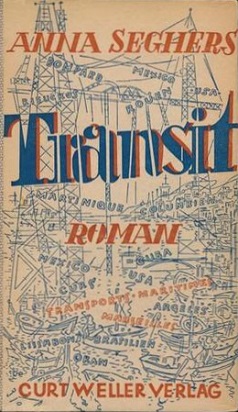
Transit is a novel by German writer Anna Seghers, set in Vichy Marseilles after France fell to Nazi Germany. Written in German, it was published in English in 1944, and has also been translated into other languages.


















